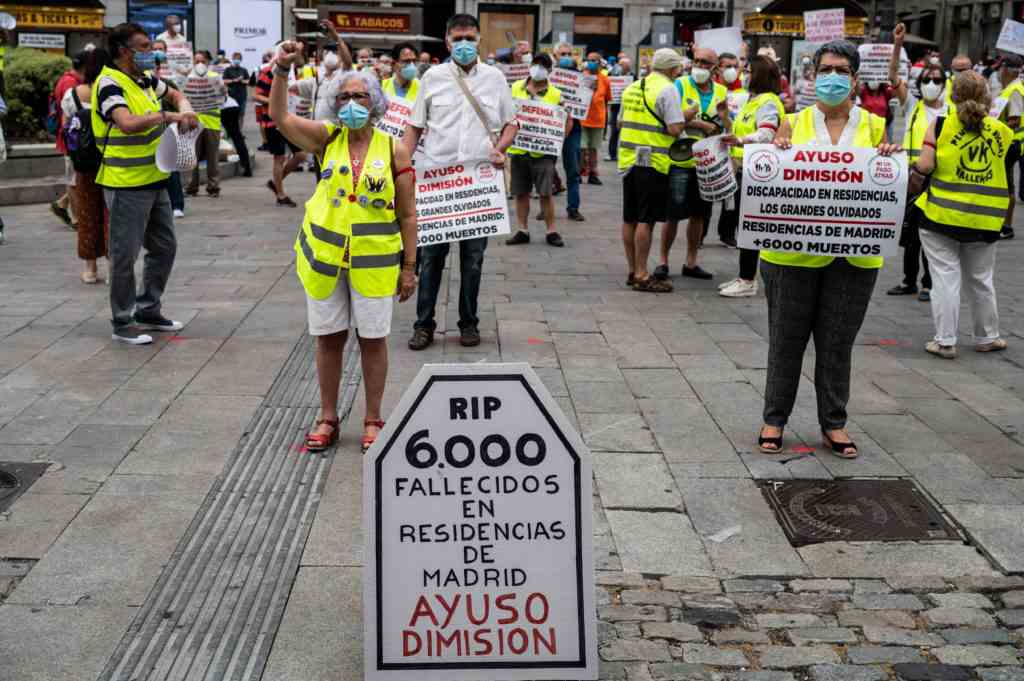COVID-19 should have ended Isabel Díaz Ayuso. Instead, it propelled her into the highest echelons of Spanish politics.
When the pandemic hit, the conservative politician had recently been elected as president of the region of Madrid. Widely regarded as inexperienced, having come into office almost by accident, she faced a challenge that would test even the most grizzled administrator — and by any accounting of the numbers, it didn’t go well.
The Spanish capital would eventually register one of the highest excess mortality rates in Europe, with many of those deaths arguably resulting from the measures taken by Ayuso’s administration. Amnesty International called one of her administration’s decisions — an effective ban on the transfer of infected nursing home patients to regional hospitals — a violation of “the right to health, life and non-discrimination of the older people.” It is believed to have contributed to the more than 8,000 deaths in the region’s nursing homes during the first months of the pandemic.
“It was all surreal: the government would issue these orders and then disappear,” recalled anesthesiologist Mónica García, spokesperson for the opposition Más Madrid party in the regional parliament.
“It was like a ship in a storm,” she added, “with the captain hiding in his cabin while the sailors — in this case, the medical professionals — tried to keep the thing afloat on their own.”
Whatever the human toll, politically Ayuso kept right on sailing. Rather than accept blame for the deaths, she seized on the unpopularity of Spanish Prime Minister Pedro Sánchez’s left-wing coalition and went on the attack, accusing the national government of inaction and railing against its coronavirus lockdowns.
After the national government ceded control over COVID rules to Spain’s regional authorities, Ayuso brazenly disregarded the recommendations of the national health experts and reopened the capital’s hospitality sector. It was a popular position among the region’s restaurateurs, who hailed her as their “patron saint.” When infections kept rising, Ayuso again pointed the finger at national authorities, claiming they were failing to test foreigners arriving at Madrid-Barajas International Airport.
“It was an absurd suggestion — the highest infection rates were in the region’s poorest neighborhoods, full of front-line workers, not frequent flyers — but it worked,” said Pablo Simón, political scientist at Madrid’s Carlos III university.
“She managed to get the narrative focused on the airport instead of the lack of social services,” Simón added. “She treated the pandemic as if it were just another issue to be handled with political communication.”
‘I’m a fighter’
A member of the conservative Popular Party, Ayuso is now arguably Sánchez’s most dangerous rival — a position she’s reached through a combination of charisma, bravado and willingness to work with Spain’s surging far right.
According to recent polls, Ayuso’s future is practically guaranteed in Madrid, where she would net the most votes if snap regional elections were to be held. But she’s also become a national star on the right, with the capacity to sway masses well beyond the borders of the Spanish capital.
By never backing down from fights, the 43-year-old Ayuso has projected the image of herself as a champion of all Spaniards against impositions from an allegedly “radical” left. In the normally subdued regional parliament, Ayuso shakes things up by referring to the opposition as “communists” and has accused them of wanting to set fire to Catholic churches (as anticlerical rioters did prior to the country’s bloody civil war).
Outside the hemicycle, she has taken potshots at the region’s nurses and accused them of being lazy. Time and time again, she has accused Sánchez’s government of being dictatorial. And at one point she even started a feud with Pope Francis over his decision to apologize for the Catholic Church’s crimes in Mexico.
“It’s Politics 101,” said Santi Rivero, a regional MP and LGBTQ+ coordinator for the Socialist party. “She always punches above her weight, taking on enemies that make her seem bigger, more relevant than she actually is.”
“I’m a fighter,” Ayuso said in an interview with POLITICO. “I fight and fight and fight, and by insisting and never giving up things work themselves out.”
Far from alienating the public, her pugnacious style has made her a darling of the masses, a political rock star who can’t wander through the streets of what is now her city without being stopped by fans of all ages demanding selfies or calling her guapa (“gorgeous”).
“We love her because she tells it like it is,” said Tomás, a barman in the capital’s working-class Legazpi district. “She doesn’t try to sell you on B.S. like other politicians, and that’s why we like her.”
Ayuso argues her way of speaking is popular among Spaniards because it’s the opposite of that espoused by “totalitarian governments — which aren’t always left-wing — that evoke revolutions, feelings, utopia … things that may be inspiring, but aren’t concrete.”

“I can’t stand people who waste my time by being vague,” Ayuso said. “I don’t think voters who pay their taxes and get up early each morning and struggle through life should deal with that from me, either.”
Ayuso herself is no stranger to vagueness. Her political philosophy revolves around the concept of “liberty,” which she describes as a loose “ownership for the decisions you take — and letting others do exactly the same thing.”
Ribero, the Socialist MP, said that Ayuso had won over the public by speaking in slogans and by abandoning “the protocol of formal politics that people associate with stuffy politicians who wear suits and follow the rules.”
“Ayuso is the sort of person that will show up to inaugurate a sports center and not think twice about throwing on the local team’s jersey,” he said. “People like that she says random things, makes them laugh, and isn’t afraid to be politically incorrect … That informality has made her a pop-icon.”
Joke candidate
Ayuso’s introduction to the world of politics came in the early 2000s, when she was tapped to serve as the community manager for Madrid’s then-regional president, Esperanza Aguirre.
“She came from a modest family with a father with problems, and so she had gone out to make a living when she was 19 or 20 years old,” Aguirre told POLITICO. “I recognized in her a keen sense for politics and she did not let me down.”
Ayuso had studied journalism and served within the youth wing of the conservative Popular Party, but it was as part of Aguirre’s team that she received her political education. Although the two women couldn’t be more different — Aguirre is a countess who lives in a palace in central Madrid, while Ayuso comes from a solidly middle-class family — both became political powerhouses by cannily using the media to their advantage.
During her presidency, Aguirre was routinely featured on a comedy show called “Caiga quien Caiga” in which gonzo journalists would challenge public figures with irreverent questions. While other politicians fled from their microphones, Aguirre happily sparred with the comedians, lapping up the free airtime that was turning her into a household name nationwide.
Ayuso quickly grasped Aguirre’s no-publicity-is-bad-publicity strategy and just as rapidly ascended within the then-president’s inner circle. “She was very good,” recalled Aguirre, a free market evangelist who lists former British Prime Minister Margaret Thatcher as one of her role models. “She read all the papers, and she knew what my liberal principles were perfectly, and unlike other community managers I’ve had she never put her foot in it by making statements on my behalf.”
According to Aguirre, Ayuso was so good at channeling her boss’ thoughts that she was eventually allowed to launch a combative Twitter account for the regional president’s Jack Russell terrier, Pecas. In caustic tweets, the account took aim at Aguirre’s center-left opposition, whom the dog accused of “not wanting freedom. Bark!”
Ayuso, who maintains she didn’t manage the account’s day-to-day tweets, left Aguirre’s staff in 2015 to become a member of Madrid’s regional parliament, but her time in the chamber was so unremarkable that when she was named her party’s candidate for the region’s presidency in 2019, few voters knew who she was.

During the campaign, Ayuso did little to dispel her image in the press of a joke candidate with zero experience who had been put up for a post few expected the corruption-stained Popular Party to win. In one interview, she made headlines by celebrating Madrid’s 3 a.m. traffic jams as a “sign of our city’s identity.” In another chat with journalists, she said that it wasn’t a lack of jobs that was driving young Spaniards to emigrate, but rather a desire to “share their culture” with the rest of the world.
On election day, Ayuso’s party came in second, with 22 percent of the vote. But after the left was unable to secure a majority in the regional parliament, the Popular Party forged a coalition agreement with the liberal Ciudadanos party and negotiated parliamentary backing from the far-right Vox party.
Ayuso, the joke candidate ridiculed by the press, ended up being sworn in as Madrid’s president anyway.
Modern-day chulapa
Since taking office Ayuso has cultivated both the image of a Spanish everywoman and, more specifically, that of a modern-day chulapa, the Madrid region’s turn-of-the-century archetype of a working-class female, traditionally depicted as speaking with a mix of charm and insolence.
By regularly claiming that the national government is attacking Madrid, Ayuso has stolen the playbook traditionally used by Spain’s leftist independence parties in regions like Catalonia and the Basque Country. And by mixing that neo-regionalist rhetoric with her natural combativeness and her status as Spain’s anti-lockdown champion, Ayuso has hit on a winning formula that has allowed her to defeat some of her country’s most prominent politicians.
The first was Pablo Iglesias, the leader of the far-left Unidas Podemos group, who unexpectedly left Sánchez’s cabinet to stand against Ayuso after she called a snap election in 2021. “It was an inexplicable move on Iglesias’ part,” said Simón. “He was a polarizing figure, and putting him in the mix simultaneously raised Ayuso’s profile while giving her the perfect foil.”
When news of Iglesias’ candidacy broke, Ayuso reacted with obvious delight and adopted a campaign slogan that — purposely or not — evoked a six-year-old tweet from Aguirre’s dog Pecas: “Communism or liberty.”
While her campaign was once again punctuated by surreal statements — including a bizarre celebration of Madrid as the city where “you can break up with your partner and never run into them again” — this time Ayuso came across as a much more experienced candidate who felt comfortable with owning her outlandish phrases.
She also revealed herself to be comfortable with flirting openly with Vox’s voters, rejecting other parties’ calls to eschew the far-right group’s supporters. Faced with criticism, Ayuso shrugged and said “when they call you a fascist you know you’re doing something right.”
Throughout the campaign Ayuso happily attacked Iglesias at campaign events, but she cannily limited her face to face interactions with him — betting on his unpopularity to catapult her back into office.
Her calculation was spot-on. While Auyso fell short of an outright majority, her party received twice as many votes as it had in 2019, and more than enough to come to a fresh parliamentary pact with Vox, which agreed to support Ayuso’s minority government as an external backer.
“The impressive electoral success of the Trumpist right that Ayuso represents is a tragedy for health, education and public services,” said Iglesias, who subsequently announced his exit from active politics. “I predict that these results will exacerbate the territorial problems in Spain.”
Ayuso’s next challenger was the leader of her own party, Pablo Casado. While he had personally selected Ayuso to be the party’s candidate in Madrid in 2019, two years later her star quality was outshining his own.

The two attempted to keep things civil publicly, but the tension between them was evident. Ayuso wanted to be named the party’s regional head, but Casado’s team kept finding ways to keep her from that position.
The situation took an unexpectedly dramatic turn in February, when Ayuso shocked the nation by publicly accusing Casado of hiring detectives to dig up incriminating evidence to discredit her.
Rather than deny the accusation, Casado confirmed the party was investigating Ayuso because it had evidence that her brother had received thousands of euros in commissions linked to a €1.5 million regional government contract to procure face masks during the COVID pandemic. He added that a disciplinary procedure would be launched against Ayuso as a result of the evidence, which was deemed “relevant enough to conclude that there has been influence peddling.”
Within days the party leader was forced to shelve the procedure when it became clear that, whatever his evidence, the charismatic Madrid president’s popularity was far greater than his own. After thousands of PP hardliners surrounded the party’s headquarters in Madrid, calling for Casado’s resignation and Ayuso’s election to the party leadership, he agreed to step down.
Tilting right
Since eliminating Casado and his stalwarts, Ayuso has moved to consolidate power in Madrid. Last month she got her wish of becoming head of the Popular Party in the Madrid region. Ayuso told POLITICO her predecessors had treated the local government as “a placement agency” for loyalists and lackies. She said the leadership position was important to her because it would give her the ability to fill those positions with her own people.
Ayuso hasn’t survived her fight with Casado completely unscathed. Weeks after the scandal broke, she admitted that the region paid her brother at least €55,850 as part of a contract to procure masks. In March it was reported that the European Public Prosecutor’s Office had opened an investigation into the matter as a potential fraud committed with EU funds, but the status of the case is unclear due to a competence adjudication conflict with Spain.
Ayuso denies there was any wrongdoing and insists the whole affair is part of a “campaign to which the left has subjected me since the very start.” She added that her opponents had a habit of attacking her through the men in her life: “If they don’t go after my ex-boyfriend or husband, they go after my brother … Or my chief of staff,” she said, referring to Miguel Ángel Rodríguez, a veteran political operative who is often described as the éminence grise behind Ayuso. “It’s very sexist.”
The Popular Party’s new president, Alberto Núñez Feijóo, has avoided clashes with Ayuso since succeeding Casado. A long-serving president of the Galicia region, Feijóo is known as an able administrator, but it’s not yet clear if his low-key, moderate style will play in Spain’s increasingly polarized political landscape.
As he finds his footing, Ayuso has not hesitated to keep pushing the Popular Party to the right. In March, she campaigned on behalf of her party in the regional elections in Castilla y León and urged its representatives to come to an agreement with Vox. The region’s Popular Party subsequently entered into a coalition with the ultranationalist party, marking the first time the far right has been allowed into a regional government in Spain since the end of the Franco regime.
At a recent campaign event in Andalusia — where elections are scheduled for June 19 — she urged her party to reach a similar agreement if they don’t win an outright majority, adding that “Vox and the Popular Party have a lot to do.”
In Madrid, where Vox provides external support to Ayuso’s minority government, collaboration between the two is ongoing. In December, Ayuso allowed Vox to present an (ultimately defeated) bill to slash LGTBQ+ rights in the capital. The far-right party has, in turn, backed legislation that effectively gives Ayuso’s government control over the region’s public television channel. The effectiveness of the alliance has only emboldened Ayuso’s unapologetic defense of political partnerships with Spain’s ultranationalists.
“The opposition doesn’t want us to make deals with Vox because then we won’t have anyone with whom to form coalitions and so we’ll never be able to form governments,” she told POLITICO. “But we can’t decide who is and isn’t allowed to be part of Spain’s political institutions.”
“My party will always participate in elections with the most ambitious project … But if we have to form coalitions, we should do so with those with whom we have the most in common,” she added.
Since becoming party leader, Feijóo has been careful to avoid crossing Ayuso, and to adopt stances similar to hers whenever possible. While he had previously rejected deals with Vox, this spring he green-lit the coalition with Vox in Castilla y León.
It remains to be seen if Feijóo’s tactic of appeasing Ayuso will save him from suffering his predecessor’s fate. Ayuso is indisputably the most charismatic figure within their party, and few doubt she would pass up a serious opportunity to jump to the national stage.
“She has to win [next year’s] regional elections first, but why not?” asked Aguirre. “She has an extraordinary way of speaking that connects with everyone, she’s smart and, why not admit it, beautiful as well.”
Pablo Iglesias, Ayuso’s one-time rival for the presidency of the Madrid region, said that if she wants to become Spain’s prime minister, “she could absolutely do it.”
“If Donald Trump became president of the United States, anyone can become president of any country,” he said, adding that Ayuso knew how to use “the Trumpian tactic of embracing alternate facts and outright lies as legitimate political tools.”
Más Madrid’s García said she wouldn’t be surprised if Ayuso threw her hat in the ring eventually. “What Ayuso loves is power,” García said. “She’s driven by this real will to accumulate power and she’ll do anything to perpetuate herself in a position of power.”
Ayuso insists that her political future lies solely in Madrid and said that her only interest is serving that citizenry. Asked if she means the citizens of Madrid region or those of Spain, Ayuso wryly noted that she makes no real distinction between the two: “Madrid is Spain, and Spain is Madrid — they’re the same thing,” she said with a smile.
SPAIN NATIONAL PARLIAMENT ELECTION POLL OF POLLS
For more polling data from across Europe visit POLITICO Poll of Polls.

